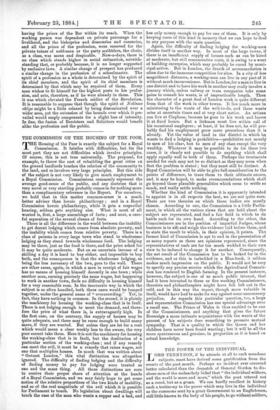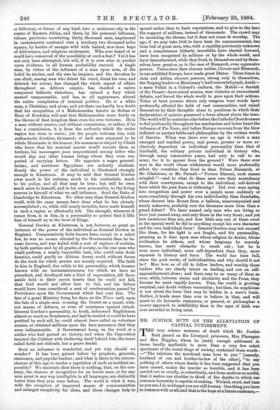THE POWER . OF THE INDIVIDUAL.
JORD TENNYSON, if he attends at all to such mundane J subjects, mast have derived some gratification from the events of the past month. Perhaps no incident ever occurred better calculated than the despatch of General Gordon to dis- abuse men of the melancholy belief that "the individual withers, and the world is more and more," which the poet uttered not as a creed, but as a groan. We can hardly recollect in history such a testimony to the power which may live in the individual as the summons sent by a great Government to an Englishman, still little known to the body of his people, to go without soldiers, or followers, or forces of any kind, into a mutinous city in the centre of Eastern Africa, and there, by his personal influence, release garrisons numbering thirty thousand men, imprisoned in cantonments scattered over a territory two thousand miles square, by hordes of savages wild with hatred, new.born hope of deliverance, and religious excitement. Who ever heard of or .4:Quid have conceived of the possibility of such a feat Yet it has not only been attempted, but will, if it is ever wise to predict upon evidence, in all human probability succeed. A single man, by virtue of the influence of a man upon men, of the• belief he excites, and the awe he inspires, and the devotion he can elicit, among men who detest his creed, dread his race, and distrust his colour, has changed the whole aspect of affairs throughout an African empire, has checked a native conqueror hitherto victorious, has calmed a fury which seemed unappeasable, and has, to all appearance, altered the entire complexion of internal politics. He is a white man, a Christian, and alone, and yet there can hardly be a doubt that his recognition of a Mahommedan fanatic as Sultan or Emir of Kordofan will seat that Mahommedan more firmly on the throne of that kingdom than even his own victories. He is a man without armies, and without commission, or rather, if he has a commission, it is from the authority which the entire -region has risen to resist; yet the people welcome him with enthusiastic devotion, thousands of dark men supposed to be rebels illuminate in his honour, his summons is obeyed by Chiefs who know that his nominal master would execute thorn as traitors, his messengers pass unquestioned among tribes who would slay any other human beings whom they even sus- pected of carrying letters. He appoints a negro general- issimo, and mutinous Egyptians are ardently obedient. Surely the power of the individual is illustrated strongly enough in Khartoum. It may be said that General Gordon owes much to his uniform, much to his credentials, much to his policy, and all that may be true ; but still he owes much more to himself, and to his own personality, to the living sources in himself of what we call influence. Send the Duke of Cambridge to Khartoum. No other man than General Gordon could, with the same means, have done what he has already accomplished ; or, while still nearly invisible, have made himself in such a region so effectually felt. The strength, wherever it comes from, is in him, in a personality so potent that it lifts him of himself up to the level of Kings.
General Gordon at Khartoum is not, however, so great an instance of the power of the individual as General Gordon in England. Comparatively little known here, except to a select few, he was no sooner selected by the Government than he be- came known, and was hailed with a sort of rapture of acclaim, by both parties and by all grades of society, as the one man who could perform a nearly impossible task, who could calm Arab fanatics, could pacify an African desert, could without forces do the work for which armies are usually required. The faith in him in England, due solely to his personality, which became known with an instantaneousness for which we have no precedent, and developed into a kind of superstition, till thou- sands held in their secret hearts that he could not fail, that God would not allow him to fail, and his failure would have been considered a sort of condemnation passed by Providence upon the Government which had sent him. The fate of a great Ministry hung for days, as the Times said, upon the fate of a single man crossing the Desert on a camel, with- out means of defence, or even of resistance against attack. General Gordon's personality, in truth, influenced Englishmen almost as much as Soudanese, and had he needed or could he have profited by such aid, he could almost have called up volunteer armies, or obtained millions upon his bare assurance that they were indispensable. A Government hung on the word of a soldier who had gained no victory, and when the Opposition taunted the Cabinet with sheltering itself behind him, the taunt called forth not ridicule, but a grave denial.
Such an influence is wonderful, and yet why should we wonder? It has been gained before by prophets, generals, statesmen, and popular leaders ; and what is there in the circum- stances of this age to render a repetition of such an incident im- possible ? We maintain that there is nothing, that, on the con- trary, the chances of recognition for an heroic man, or for any man great in any way intelligible in all languages, are distinctly better than they ever were before. The world is what it was, with the exception of improved means of communication and enlarged receptivity for ideas, and those changes help to
spread rather than to limit reputations, and to give to the irero the support of millions, instead of thousands. The crowd may be ascending the throne, but it does not cease to worship. The age, if we may take 1848 to have been its commencement, has been full of great men, who, with a rapidity previously unknown and a completeness hitherto incredible, have started forward, have been recognised by millions or by the whole world, and have thenceforward, while they lived, in themselves and by them- selves, been great or;as in the case of Bismarck, even oppressive powers. Twice since then obscure nobles, Cavour and Bismarck, in our solidified Europe, have made great States. Three times in Asia and Africa, obscure persons, strong only in themselves, the Taiping leader—a Missionary's half-converted pupil, Arabi- a mere Fellah in a Colonel's uniform, the Mahdi—a dervish of the Desert—have raised armies, won victories or encountered defeats, and forced the whole world to gaze upon their actions. Twice at least persons whose only weapons were words have profoundly affected the faith of vast communities, and raised themselves by their thoughts alone to positions in which their declarations of opinion possessed a force almost above the laws. The world will be centuries older before the Catholic Church ceases to feel profoundly throughout her mechanism and in her heart the influence of Pio Nono, and before Europe recovers from the blow inflicted on ancient faiths and philosophies by the written words of Darwin. When was there ever an age in which a man emerged and reached power, real power, greater or more ex- clusively dependent on individual personality than that of Garibaldi, the solitary private individual in history who, through many consecutive years, had only to call to an army, for it to appear from the ground ? Were there ever men in the world whose withdrawal would more profoundly affect the countries they lived in than Prince Bismarck, or Mr. Gladstone, or Mr. Parnell—" Powers Eternal, such names mingled !"—and to what do these men owe their ascendancy with their countrymen, except to the individual, self-derived force which the poet fears is withering? Did ever man spring into recognition and power over a people more suddenly or more completely through his own individuality than Gambetta, whose descent into Rouen from a balloon, unaccompanied and nearly unknown, probably cost the Germans more lives than a grand defeat ? We have named only men who are living or have just passed away, and only those in the very front; and yet how numerous they are, and how little any one of them owed in the special work he did to anything except his own character and his own individual force ! General Gordon may not succeed like them, for his fight is not fought, and his personality, pressing as it does upon men whose religion he denies, whose civilisation he abhors, and whose language he scarcely knows, has more obstacles to crash out ; but he is even more individual, more self-dependent than they, more separate in history and force. The world has been full, since the poet wrote, of individualities, and why should it not be ? Men love as of old to follow leaders, and worship those leaders who are clearly intent on leading, and not on self- aggrandisement alone; and there may be as many of them. as ever, while, between steam and electricity and the Press, they become far more rapidly known. True, the world is growing sceptical, and doubt withers veneration ; but then, its scepticism is not about the force that may lie hidden in a man's brain. Rather, it tends more than ever to believe in that, and will grant to its favourite statesman, or general, or philosopher a nearer approach to infallibility than in the ages of faith was ever accorded to living saint.



































 Previous page
Previous page